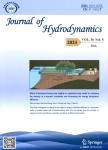A SIMPLIFIED NUMERICAL MODEL OF 3-D GROUNDWATER AND SOLUTE TRANSPORT AT LARGE SCALE AREA
A SIMPLIFIED NUMERICAL MODEL OF 3-D GROUNDWATER AND SOLUTE TRANSPORT AT LARGE SCALE AREA作者机构:State Key Laboratory of Water Resources and Hydropower Engineering Wuhan University Wuhan 430072China Institute of Soil Science Chinese Academy of Sciences Nanjing 210008 China
出 版 物:《Journal of Hydrodynamics》 (水动力学研究与进展B辑(英文版))
年 卷 期:2010年第22卷第3期
页 面:319-328页
核心收录:
学科分类:08[工学] 09[农学] 0835[工学-软件工程] 0901[农学-作物学] 081202[工学-计算机软件与理论] 0812[工学-计算机科学与技术(可授工学、理学学位)]
基 金:supported by the National Science Fund for Distinguished Young Scholars(Grant No.40701071)
主 题:groundwater movement solute transport simplified model 3-D mass balance numerical simulation
摘 要:A simplified numerical model of groundwater and solute transport is developed. At large scale area there exists a big spatial scale difference between horizontal and vertical length scales. In the resultant model, the seepage region is particularly divided into several virtual layers along the z direction and vertical 1-D columns covering x-y 2-D area according to stratum properties. The numerical algorithm is replacing the full 3-D water and mass balance analysis as the 2-D Galerkin finite element method in x- and y-directions and 1-D finite differential approach in the z direction. The reasonable method of giving minimum thickness is successfully used to handle transient change of water table, drying cells and problem of rewetting. The solution of the simplified model is preconditioned conjugate gradient and ORTHOMIN method. The validity of the developed 3-D groundwater model is tested with the typical pumping and backwater scenarios. Results of water balance of the computed example reveal the model computation reliability. Based on a representative 3-D pollution case, the solute transport module is tested against computing results using the MT3DMS. The capability and high efficiency to predict non-stationary situations of free groundwater surface and solute plume in regional scale problem is quantitatively investigated. It is shown that the proposed model is computationally effective.




